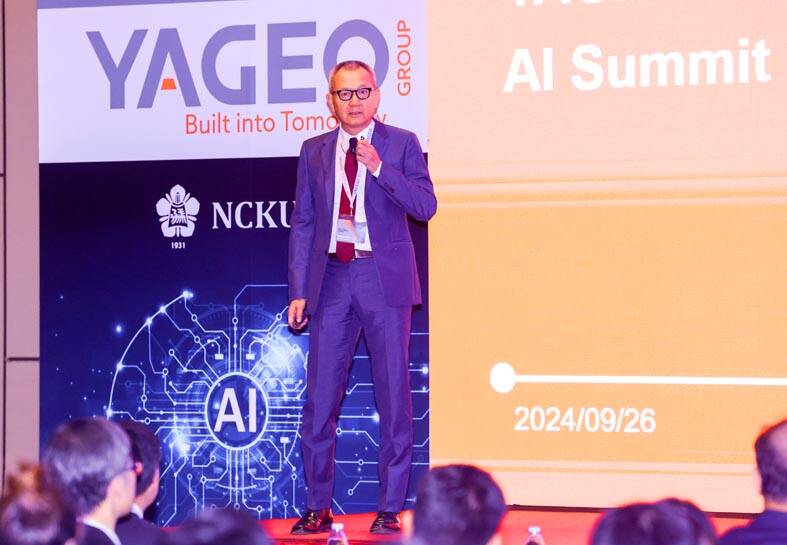Kaimei Electronic Corp (凱美), a supplier of passive components, yesterday said it has allocated a majority of its chip resistor manufacturing capacity to a Malaysian factory from China to brace for potential tariff hikes on Chinese goods from the US.
The company’s remarks came amid investors’ growing concern about escalating trade frictions between China and the US, and how the US’ new trade policies would play out after US president-elect Donald Trump takes office on Jan. 20. Trump has threatened to levy 10 percent more on Chinese imports.
“We have deployed a full production line this year in Malaysia to produce chip resistors. We are evaluating the possibility of using the facility to produce other products to cope with customers’ manufacturing relocations,” Kaimei spokesman Andrew Lee (李彥儒) told a virtual investors’ conference yesterday.

Photo: CNA
“We are providing more flexibility for customers in terms of manufacturing sites, allowing us to have a competitive edge over Chinese rivals,” Lee said.
The new Malaysian factory produces 80 percent of Kaimei’s chip resistors, a surge from 40 percent in the past, Lee said.
Its Chinese factory in Kunshan, Jiangsu Province, used to be the company’s manufacturing hub, making up 60 percent of its total chip resistors. Now, the Chinese factory makes up a mere 20 percent of its total production of chip resistors, he said.
Kaimei is 7.34 percent owned by Yageo Corp (國巨), the world’s third-largest passive component supplier.
For next year, Kaimei holds a cautiously optimistic view about its business outlook, Lee said, adding that factory utilization would improve, from 50 percent for its chip resistor factories and 80 percent for its aluminum electrolytic capacitor and cooling fan factories.
Artificial intelligence (AI) “remains the bright spot next year. Kaimei will not be absent from the market,” Lee said. “The introduction of new artificial intelligence PCs and power supplies for those devices is to stimulate new demand for passive components.”
Kaimei would benefit from the AI uptakes next year as AI devices usually require high-end passive components, which carry higher average selling prices, he said.
The outlook for the current quarter is lackluster, as the prospects for the world economy remain unclear and uncertain before Trump takes office, Kaimei said.
Revenue this quarter would drop slightly from NT$1.38 billion (US$42.4 million) in the third quarter, Lee said.
Chip resistors made up 46 percent of the company’s total revenue during the first three quarters of this year. Aluminum electrolytic capacitors accounted for 44 percent, with the remaining 10 percent of revenue from cooling fans.
China remained the biggest market for the company, making up a sizeable revenue share of 65 percent during the first three quarters, while the US market only constituted 3 percent.
Net profit expanded 14 percent year-on-year to NT$378 million during the first three quarters compared with NT$332 million in the same period last year. Earnings per share rose to NT$3.48 from NT$3.05.
Gross margin improved to about 19 percent during the nine-month period ending September from about 16 percent in the same period last year.

DIVIDED VIEWS: Although the Fed agreed on holding rates steady, some officials see no rate cuts for this year, while 10 policymakers foresee two or more cuts There are a lot of unknowns about the outlook for the economy and interest rates, but US Federal Reserve Chair Jerome Powell signaled at least one thing seems certain: Higher prices are coming. Fed policymakers voted unanimously to hold interest rates steady at a range of 4.25 percent to 4.50 percent for a fourth straight meeting on Wednesday, as they await clarity on whether tariffs would leave a one-time or more lasting mark on inflation. Powell said it is still unclear how much of the bill would fall on the shoulders of consumers, but he expects to learn more about tariffs

NOT JUSTIFIED: The bank’s governor said there would only be a rate cut if inflation falls below 1.5% and economic conditions deteriorate, which have not been detected The central bank yesterday kept its key interest rates unchanged for a fifth consecutive quarter, aligning with market expectations, while slightly lowering its inflation outlook amid signs of cooling price pressures. The move came after the US Federal Reserve held rates steady overnight, despite pressure from US President Donald Trump to cut borrowing costs. Central bank board members unanimously voted to maintain the discount rate at 2 percent, the secured loan rate at 2.375 percent and the overnight lending rate at 4.25 percent. “We consider the policy decision appropriate, although it suggests tightening leaning after factoring in slackening inflation and stable GDP growth,”

Meta Platforms Inc offered US$100 million bonuses to OpenAI employees in an unsuccessful bid to poach the ChatGPT maker’s talent and strengthen its own generative artificial intelligence (AI) teams, OpenAI CEO Sam Altman has said. Facebook’s parent company — a competitor of OpenAI — also offered “giant” annual salaries exceeding US$100 million to OpenAI staffers, Altman said in an interview on the Uncapped with Jack Altman podcast released on Tuesday. “It is crazy,” Sam Altman told his brother Jack in the interview. “I’m really happy that at least so far none of our best people have decided to take them

As they zigzagged from one machine to another in the searing African sun, the workers were covered in black soot. However, the charcoal they were making is known as “green,” and backers hope it can save impoverished Chad from rampant deforestation. Chad, a vast, landlocked country of 19 million people perched at the crossroads of north and central Africa, is steadily turning to desert. It has lost more than 90 percent of its forest cover since the 1970s, hit by climate change and overexploitation of trees for household uses such as cooking, officials say. “Green charcoal” aims to protect what